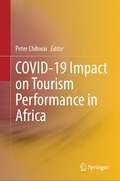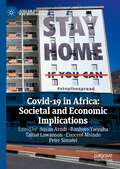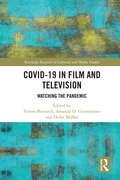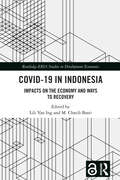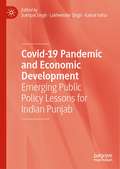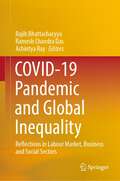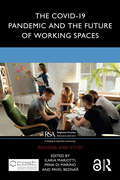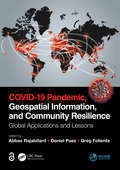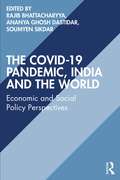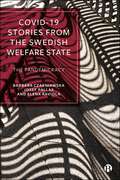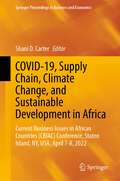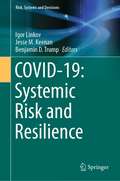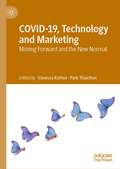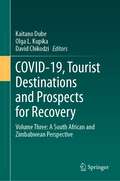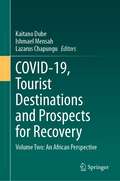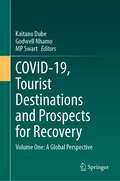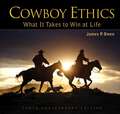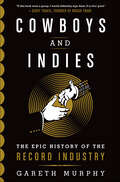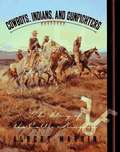- Table View
- List View
COVID-19 Experience in the Philippines: Response, Surveillance and Monitoring Using the FASSSTER Platform (Disaster Risk Reduction)
by Maria Regina Justina Estuar Elvira De Lara-TuprioThis book provides an overview of the extensive work that has been done on the design and implementation of the COVID-19 Philippines Local Government Unit Monitoring Platform, more commonly known as Feasibility Analysis of Syndromic Surveillance Using Spatio-Temporal Epidemiological Modeler for Early Detection of Diseases (FASSSTER). The project began in 2016 as a pilot study in developing a multidimensional approach in disease modeling requiring the development of an interoperable platform to accommodate input of data from various sources including electronic medical records, various disease surveillance systems, social media, online news, and weather data. In 2020, the FASSSTER platform was reconfigured for use in the COVID-19 pandemic. Using lessons learned from the previous design and implementation of the platform toward its full adoption by the Department of Health of the Philippines, this book narrates the story of FASSSTER in two main parts.Part I provides a historical perspective of the FASSSTER platform as a modeling and disease surveillance system for dengue, measles and typhoid, followed by the origins of the FASSSTER framework and how it was reconfigured for the management of COVID-19 information for the Philippines. Part I also explains the different technologies and system components of FASSSTER that paved the way to the operationalization of the FASSSTER model and allowed for seamless rendering of projections and analytics. Part II describes the FASSSTER analytics and models including the Susceptible-Exposed-Infected-Recovered (SEIR) model, the model for time-varying reproduction number, spatiotemporal models and contact tracing models, which became the basis for the imposition of restrictions in mobility translated into localized lockdowns.
COVID-19 Impact on Tourism Performance in Africa
by Peter ChihwaiThis book examines the impact of the COVID-19 pandemic on tourism performance in Africa. It covers a wide range of topics that will interest academic readers and researchers, including the effects of COVID-19 on various segments of the tourism sector. The aim is to provide a deeper understanding of the damage caused by the pandemic, enriching future research based on the findings and conclusions presented in the book. The research presented in this book is new and original, representing different perspectives from across Africa's 52 countries. It offers valuable insights for the business world on how to adapt and adopt communication strategies during crises such as COVID-19. Themes such as innovation, service quality, and continuous improvement during the pandemic are explored, providing lessons that can benefit the tourism industry in navigating similar challenges in the future. Additionally, the book discusses the future of tourism, presenting various perspectives on what the future holds for the tourism industry. This provides an exciting platform for tourism stakeholders to learn about the future of the sector from diverse and knowledgeable angles. The unique perspectives offered, especially those from Africa, will appeal to a wide and diverse audience, including ecotourists, educational tourists, adventure tourists, governments, academics, and other stakeholders.
Covid-19 in Africa: Societal and Economic Implications (African Histories and Modernities)
by Susan Arndt Banhoro Yacouba Taibat Lawanson Enocent Msindo Peter SimateiWritten amidst the ongoing Covid-19 pandemic, this edited volume draws on the expertise of social scientists and humanities scholars to understand the many ramifications of Covid-19 on societies, politics, and the economies of Africa. The contributors examine measures, communicative practices, and experiences that have guided the (inter)action of governments, societies, and citizens in this unpredictable moment. Covid-19 tested governments’ disaster preparedness as well as exposed governments’ attitudes towards the poor and vulnerable. In the same vein, it also tested the agency of the African populace in the face of containment measures and their impact on everyday social, cultural, and economic practices of ordinary people. In this vein, our concern is to understand the relationship between growing vulnerability on the one hand, and ingenuity of agency on the other, and how both were embodied, narrated and discoursed by the African poor, university students, religious entities, middle-classes, and those who bore the major brunt of the lockdowns.The volume is thus a useful resource for scholars of Africa, policy makers and those who want to understand Covid-19 in Africa. It provides a multiplicity of perspectives of the pandemic and African responses at different levels of society, economy and the political spectrum. The continental focus of this volume gives room for broader comparative analyses. Lastly, this interdisciplinary work benefits from the input of medical historians, anthropologists, sociologists, linguists, political scientists, literature scholars, urban planners, geographers and others.
Covid-19 in Film and Television: Watching the Pandemic (Routledge Research in Cultural and Media Studies)
by Verena Bernardi Amanda D. Giammanco Heike MißlerThis collection explores the impact of Covid-19 on the production and consumption of television and film content in the English-speaking world. Offering in-depth analysis of select on-screen entertainment, the volume addresses entertainment’s changing role during and following the Covid-19 pandemic. It also studies the pandemic’s incorporation into the narrative of numerous series, films, and other televised formats, capturing the moments and contexts in which these developments emerged. Chapters examine the pandemic’s impact both on a micro- and macro level, focusing on the content as well as form of TV shows and films. Bringing together an international team of scholars, the book offers a range of perspectives, exploring phenomena such as the ‘YouTubification’ of audience-reliant late-night television, as well as films and TV shows such as Superstore, Grey’s Anatomy, and The Good Fight.Given the pandemic’s lasting impact on the film and television industries, this book will be a valuable read for scholars studying audience and viewer reception of on-screen content, and the impact of crises on cultural industries. It will also appeal to researchers in cultural studies, popular culture studies, television studies, internet studies, film studies, and media studies more broadly.
COVID-19 in Indonesia: Impacts on the Economy and Ways to Recovery (Routledge-ERIA Studies in Development Economics)
by Lili Yan Ing M. Chatib BasriThis book assesses the impacts of COVID-19 on the Indonesian economy, particularly on employment, education, poverty, trade, and macro economy. The book explains how fiscal and monetary stimulus work and the roles of local governments in managing stimulus. It also presents ways to recovery and lessons learnt from countries that have found success in mitigating the economic impacts of the pandemic (China, Germany, Singapore, and Vietnam). This book will be a useful reference for policy makers, scholars, students, and public audience working or having interest in the fields of development economics, trade, health economics, economics, and East Asia.
The Covid-19 Pandemic: A Public Choice View (Studies in Public Choice #42)
by Panagiotis KaradimasThis monograph evaluates public policy responses to the Covid-19 pandemic through a public choice lens. The book compares two prominent, albeit mutually exclusive, theories in social sciences—public interest theory and public choice theory—and explores how their predictions perform within the framework of the Covid-19 pandemic. The chapters present different pandemic policies alongside empirical data in order to draw conclusions about their efficacy, and, in turn, draw conclusions about the veracity of each theory. By the end of the volume, the reader will be able to draw their own conclusions about whether the pandemic policy responses served the public interest, as public interest theory suggests, or the personal interests of the politicians who implemented them, as public choice theory holds.
Covid-19 Pandemic and Economic Development: Emerging Public Policy Lessons for Indian Punjab
by Sukhpal Singh Lakhwinder Singh Kamal VattaThis book offers a comprehensive analysis of the pre-Covid-19 and post-Covid-19 situation and public policy measures needed to revive the economy in the light of the recent initiatives by the state government, including a committee to suggest post-Covid-19 revival strategy. This collection of essays by specialized author/s in her/his/their area of research examines the impact of Covid-19 in the larger context of economic and developmental context of Punjab, ranging from basic developmental transformation analysis to the specific policy issues in each sector and policy domain, including the larger developmental crisis in the context of the regional economy and society of Punjab. The sectors analysed include: agriculture including dairy sector and agricultural markets, industry, services, education, health, besides fiscal, banking, diaspora, gender, governance, and sustainability challenges the state economy faces. It dwells on sector specific issues as well as ways forward for betterment of livelihoods of those engaged, especially farmers and industrial and service sector informal workers.
COVID-19 Pandemic and Global Inequality: Reflections in Labour Market, Business and Social Sectors
by Rajib Bhattacharyya Ramesh Chandra Das Achintya RayThe book intends to capture the most critical issue that has cropped up as an aftermath of the Corona pandemic- the phenomenon of widening of global inequalities across nations depending upon their economic position, support policies of the government and international relationship particularly in the context of alarming growth of unemployed in the labour market, business activity and social sector. This book is expected to provide new areas of research to both academicians and policy makers to re-think about global cooperation for bridging the inequalities for a better world. It tries to incorporate the valuable contribution of experts from various fields of knowledge in a consolidated volume. This text will be revised once the chapters are finalized and put together in structured themes. The table of content lists some of the chapters that have been confirmed, but there are more that are being invited by the editors.
The COVID-19 Pandemic and the Future of Working Spaces (Regions and Cities)
by Ilaria Mariotti Mina Di Marino Pavel BednářThis edited volume presents a compendium of emerging and innovative studies on the proliferation of new working spaces (NeWSps), both formal and informal (such as coworking spaces, maker spaces, fab labs, public libraries, and coffee shops), and their role during and following the COVID-19 pandemic in urban and regional development and planning. This book presents an original, interdisciplinary approach to NeWSps through three features: (i) situating the debate in the context of the COVID-19 pandemic, which has transformed NeWSp business models and the everyday work life of their owners and users; (ii) repositioning and rethinking the debate on NeWSps in the context of socioeconomics and planning and comparing conditions between before and during the COVID-19 pandemic; and (iii) providing new directions for urban and regional development and resilience to the COVID-19 pandemic, considering new ways of working and living. The 17 chapters are co-authored by both leading international scholars who have studied the proliferation of NeWSps in the last decade and young, talented researchers, resulting in a total of 55 co-authors from different disciplines (48 of whom are currently involved in the COST Action CA18214 ‘The Geography of New Working Spaces and Impact on the Periphery’ 2019–2023: www.new-working-spaces.eu). Selected comparative studies among several European countries (Western and Eastern Europe) and from the US and Lebanon are presented. The book contributes to the understanding of multi-disciplinary theoretical and practical implications of NeWSps for our society, economy, and urban/regional planning in conditions following the COVID-19 pandemic. The Open Access version of this book, available at www.taylorfrancis.com, has been made available under a Creative Commons Attribution-Non Commercial-No Derivatives 4.0 license.
COVID-19 Pandemic, Geospatial Information, and Community Resilience: Global Applications and Lessons
by Abbas RajabifardGeospatial information plays an important role in managing location dependent pandemic situations across different communities and domains. Geospatial information and technologies are particularly critical to strengthening urban and rural resilience, where economic, agricultural, and various social sectors all intersect. Examining the United Nations' SDGs from a geospatial lens will ensure that the challenges are addressed for all populations in different locations. This book, with worldwide contributions focused on COVID-19 pandemic, provides interdisciplinary analysis and multi-sectoral expertise on the use of geospatial information and location intelligence to support community resilience and authorities to manage pandemics.
The COVID-19 Pandemic, India and the World: Economic and Social Policy Perspectives
by Rajib BhattacharyyaThis book analyses the economic and social impact of the Covid-19 crisis with special focus on India. It examines the economic disruption caused by the pandemic, policy responses to it and the prospect of a severe global recession. It also covers how the pandemic has contributed to considerable suffering among the masses and affected socio-cultural relationships, behavioural patterns and psychological attitudes governing human interaction. A topical and timely collection on the pandemic, the essays in the volume discuss several key themes which include, · The Corona pandemic and the changing global economy; growth, trade and macroeconomic recovery; · Public health and policy failures; appropriate policy response; · Impact on education; guidelines for the future; · Idea of economic herd immunity; impact of India’s lockdown, crisis of the migrant labourers; · Impact on agriculture, industry, firms, households and the informal sector; · Implications of digital technology for production, labour and labour relations; · Violence amidst the virus; Covid 19 and Hindu- Muslim conflict in India, domestic violence, questions of occupation, identity, gender and vulnerability; · De-globalisation and environmental challenges in the post-Covid era. Engagingly written, this comprehensive volume compiles original research by leading economists from India and abroad. It will be useful for scholars and researchers of economics, of the Indian economy, development economics, development studies, labour studies, public policy, public administration, governance, sociology and political economy.
COVID-19 Stories from the Swedish Welfare State: The Pandemicracy
by Barbara Czarniawska Josef Pallas Elena RaviolaThis book offers a unique perspective on Sweden’s COVID-19 response in its publicly funded welfare sector, which was initially highly criticised but later recognised as exemplary on the global stage in the aftermath of the pandemic. Using diaries, stories and interviews from 73 workers across 30 professions, it reveals the everyday experiences of those maintaining welfare services, both on the front lines and behind the scenes. Covering 2020 to 2022, it spans major cities and smaller municipalities across Gothenburg, Uppsala and Stockholm and introduces 'pandemicracy,' a concept exploring pandemic-era governance and organisation of the public sector. This insightful analysis sparks a wider discussion on adapting to unforeseen challenges in public welfare.
COVID-19, Supply Chain, Climate Change, and Sustainable Development in Africa: Current Business Issues in African Countries (CBIAC) Conference, Staten Island, NY, USA, April 7-8, 2022 (Springer Proceedings in Business and Economics)
by Shani D. CarterAll global countries are interdependent and all aspects of the global economy operate synergistically. The COVID-19 pandemic gave a renewed sense of urgency to focus on the synergies between supply chain, climate change, COVID-19, and sustainable development as they affect business in Africa and how what occurs in one part of the world affects the whole world. This book examines this synergy and the reciprocal impact of businesses, government, and society. Featuring contributions presented at the 2022 Current Business Issues in African Countries (CBIAC) Conference held at Wagner College in Staten Island, NY, USA, this book explores topics such as agriculture, entrepreneurship, education, gender, and capital flows in Africa demonstrating the wealth of business opportunities across the continent.
COVID-19: Systemic Risk and Resilience (Risk, Systems and Decisions)
by Igor Linkov Jesse M. Keenan Benjamin D. TrumpThis book aims to provide a collection of early ideas regarding the results of applying risk and resilience tools and strategies to COVID-19. Each chapter provides a distinct contribution to the new and rapidly growing literature on the developing COVID-19 pandemic from the vantage points of fields ranging from civil and environmental engineering to public policy, from urban planning to economics, and from public health to systems theory. Contributing chapters to the book are both scholars and active practitioners, who are bridging their applied work with critical scholarly interpretation and reflection. The book's primary purpose is to empower stakeholders and decision-makers with the most recent research in order that they can better understand the systemic and sweeping nature of the COVID-19 pandemic, as well as which strategies could be implemented to maximize socioeconomic and public health recovery and adaptation over the long-term.
COVID-19, Technology and Marketing: Moving Forward and the New Normal
by Vanessa Ratten Park ThaichonThis book addresses how Covid-19 has damaged businesses and how businesses can adapt to the new normal. In doing so, the book contributes to theories associated with the marketing management, by assessing opportunities and challenges associated with the implementation of technology and marketing management during and post Covid-19.Although there is increasing research in consumer or business management acceptance of new technologies and digital marketing, the impact of these on marketing management during the Covid-19 are not adequately investigated, leading to overstated hypothetical predictions of its future potential. Chapters in the book therefore focus on new economic models such as sharing economy and business structures such as omnichannel, where advancements have enabled firms to build a one-on-one relationship with customers by collecting, storing, aggregating and analysing customer information across various touchpoints. Contributions in the book also focus on new technologies such as blockchain, automation solution, information technology management, and customer relationship management (CRM) in highlighting connections between these new technologies and marketing management.The book will be useful for anyone aiming to gain a better understanding of the current and future technologies that may play a role or have a robust impact on marketing management during Covid-19.
COVID-19 Testing at Everlywell
by Jeffrey J. Bussgang Olivia HullIn March 2020, as COVID-19 spreads rapidly across the U.S., Everlywell founder Julia Cheek considers how to respond as a small start-up specializing in at-home lab testing. After making dramatic budget cuts, she decides to pivot the organization to address the country's testing shortage. But after a hectic few weeks building capacity at her partner labs to 30,000 COVID daily tests, the U.S. Food and Drug Administration (FDA) releases a statement warning the public that it has not granted approval for at-home tests. Cheek must decide whether to return to her core business or persist in focusing her nascent organization on COVID-19 tests, an opportunity whose commercial merit is unclear.
COVID-19, Tourist Destinations and Prospects for Recovery: Volume Three: A South African and Zimbabwean Perspective
by Kaitano Dube Olga L. Kupika David ChikodziThere has been a segmented approach to documenting the impact of COVID-19 and recovery prospects for global tourism destinations. Until this volume, though, there has not been comprehensive, concentrated efforts to take a deep-dive look into two countries’ tourism destinations in order to provide a comparative perspective. This book fills this gap by analyzing tourism impacts and recovery prospects in both Zimbabwe and South Africa. The volume opens with an introductory chapter from the editors that provide context and background. Part I of the volume looks at the impacts of COVID-19 on Zimbabwe and South Africa, Part II focuses on tourism operations during the pandemic, and Part III focuses on tourism recovery initiatives and prospects. The concluding chapter from the editors provides practical and policy implementation. This book is the third and final component of a three-volume set on the impact of COVID-19 on destination tourism around the world.
COVID-19, Tourist Destinations and Prospects for Recovery: Volume Two: An African Perspective
by Kaitano Dube Ishmael Mensah Lazarus ChapunguDespite the fact that the African tourism industry is prone to disturbances such as diseases, extreme weather events, civil unrest, wars, and other shocks, nothing could have prepared this destination for the devastating effect of the COVID-19 pandemic. In the absence of government or international agency budget support, the pandemic challenged the African tourism market to its core. The focus of this book is to assess the impact of the COVID-19 pandemic on the African tourism destination market as well as its prospects for recovery. A chapter written by the editorial team introduces the book. Following the introduction, the book offers chapters evaluating the pandemic's impact on African tourism. Chapters in the second part of the book discuss tourism recovery and how some destinations have survived the pandemic. The book concludes with a chapter providing policy recommendations and practical implementation advice. The book is part of a 3 volume series.
COVID-19, Tourist Destinations and Prospects for Recovery: Volume One: A Global Perspective
by Kaitano Dube Godwell Nhamo Mp SwartThe COVID-19 pandemic had a devastating impact on tourist destinations in developing and developed countries. Though the entire globe was impacted, the short- and long-term implications for tourism as well as prospects for recovery vary across regions. This volume showcases research on the impact of COVID-19 on tourism from across the world. The book is divided into three parts, with the stage set by an introductory chapter that will provide a background and context. Part I contains chapters that explore the impact of COVID-19 on selected international tourist destinations. Part II showcases how various hotspots across the world adjusted to the new normal under pandemic conditions. Part III is a collection of chapters that address how various destinations are attempting to recover from the shocks of the COVID-19 pandemic. The concluding chapter, written by the editors, seeks to synthesize the lessons offered in the book and provide policy and practical implementation for the tourism industry and other important tourism stakeholders.
COVID-19 und die Sportkommunikation: Der Einfluss der Corona-Pandemie auf Sport, Medien und Journalismus
by Jörg-Uwe Nieland Thomas HorkyCOVID-19 hat die Sportkommunikation nachhaltig verändert. Der Band bietet empirische Analysen, Einschätzungen und theoretische Ansätze sowie Erfahrungsberichte aus der Praxis zum Einfluss der Corona-Pandemie auf Medien, Journalismus und Sport. Aus unterschiedlichen Perspektiven schauen Wissenschaftlerinnen und Wissenschaftler sowie Personen aus der Praxis auf die Veränderungen in verschiedenen Medien- und Sportorganisationen sowie den Wandel von Produktions- und Arbeitsbedingungen innerhalb der Sportkommunikation. Gleichzeitig lassen sich erste Prognosen für einen Ausblick auf die Zukunft des Mediensports ableiten.
Covisint (A): The Evolution of a B2B Marketplace
by Lynda M. Applegate Elizabeth CollinsFord Motor Co., General Motors, and DaimlerChrysler--the three original equipment manufacturers (OEMs) that dominated the automotive industry throughout the 20th century--launched Covisint in February 2000 as an industry supply chain exchange that would drive out cost and help manage the complex communications within the rigidly hierarchical industry. The Big 3 sourced entire components of cars from large Tier 1 suppliers. By limiting the number of partners and using online technologies to support collaboration and performance tracking, as well as drive out costs from the supply chain, the OEMs hoped that cycle times could be shortened and they could finally achieve a build-to-order car. A successful exchange that united the industry was vital to this vision. Covisint was founded with "borrowed" Bid 3 employees and over $250 million in funding from the OEMs. Its business model morphed several times as it raced to bring products to market and to meet the demands of its founders. The start-up burned through six CEOs in three years and now Bob Paul is considering whether to take on the CEO hot seat.
Cowboy Ethics: What It Takes to Win at Life
by James P. OwenA new approach to business ethics is quietly taking hold in executive suites and corporate boardrooms across America. Frustrated by an epidemic of misbehavior at all employee levels, management teams are getting back to basics-back to the idea that personal character and individual responsibility are the ultimate keys to integrity, just as they were back in the days of the Open Range.A decade ago, the book Cowboy Ethics first inspired businesspeople to look to the Code of the West. Once they did, they discovered that its simple, common-sense principles can be more effective guides to business leadership than a truckload of corporate mission statements, rules, and ethics manuals. "Cowboys are role models because they live by a code," says author James P. Owen. "They show us what it means to stand for something, and to strive every day to make your actions line up with your beliefs. And isn't that as good a definition of integrity as you can find?" In the years since, the book's "Ten Principles to Live By" have been embraced by scores of companies, universities, and even a state government. This updated Tenth Anniversary hardcover edition traces the evolution of this grassroots business movement in brand-new chapters while preserving the inspirational lessons and stunning photography of the original. It's ideal for corporate gifts, the new graduate, business students, or any career person who cares about doing the right thing.
Cowboys and Indies: The Epic History of the Record Industry
by Gareth MurphyCowboys and Indies is nothing less than the first definitive history of the recording industry on both sides of the Atlantic.From the invention of the earliest known sound-recording device in 1850s Paris to the CD crash and digital boom today, author and industry insider Gareth Murphy takes readers on an immensely entertaining and encyclopedic ride through the many cataclysmic musical, cultural, and technological changes that shaped a century and a half of the industry.This invaluable narrative focuses especially on the game changers---the label founders, talent scouts, and legendary A&R men. Murphy highlights:· Otto Heinemann's pioneer label Okeh, which spread blues and jazz "race" records across America· how one man, Henry Speir, discovered nearly all the Delta blues legends (Robert Johnson, Charlie Patton, Son House, Tommy Johnson) · Sam Phillips's seminal work with Chess and Sun Records· John Hammond's discoveries (Billie Holiday, Aretha Franklin, Bob Dylan, Leonard Cohen, Bruce Springsteen) · the behind-the-scenes players of the British Invasion· Clive Davis, Ahmet Ertegun, David Geffen, and the corporate music machine· the Machiavellian moves of punk impresario Malcolm McLaren (Sex Pistols)· Chris Blackwell's triumphs for Island Records (Bob Marley, U2)· Sylvia Robinson and Tom Silverman, the hip-hop explorers behind the Sugarhill Gang, Grandmaster Flash, and Afrika Bambaataa...and much, much more. Murphy also offers a provocative look at the future through the ruminations of such vanguard figures as Martin Mills (4AD, XL Recordings, Matador, Rough Trade) and genre-busting producer Rick Rubin (Run-D.M.C., Red Hot Chili Peppers, Metallica, Johnny Cash).Drawing from memoirs, archives, and more than one hundred exclusive interviews with the legends of the record industry, including the founders and CEOs of Atlantic, Chrysalis, Virgin, A&M, Sub Pop, and Sire, this book reveals the secret history behind the hit-making craft. Remarkable in scope and impressive in depth, Cowboys and Indies chronicles the pioneers who set the stylus on the most important labels and musical discoveries in history.
Cowboys, Indians, and Gunfighters: The Story of the Cattle Kingdom
by Albert MarrinAn action-packed story of the days when ranchers vied with the native peoples to rule the plains of North America. Marrin's accurate, carefully researched text makes it a valuable reference tool as well.
Cowen Inc.: Leveraging Data
by Boris Groysberg Sarah L. Abbott Annelena LobbCowen Inc.’s broker-dealer, Cowen and Company, LLC, boasted a number of analysts who had made prescient stock calls on the basis of creative data analysis. Now Cowen Inc. had opened a new subsidiary, Kyber, which would attempt to monetize new data science products. Robert Fagin, head of research, had to consider what Kyber’s risks were, even as the unit uncovered the possibility for new revenue streams. How could Cowen continue to exploit its competitive advantage with data?

